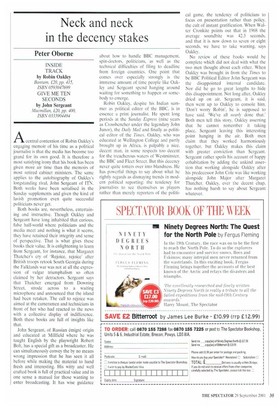Neck and neck in the decency stakes
Peter Oborne
INSIDE TRACK by Robin Oakley Bantam, £20, pp. 415, ISBN 0593047699 GIVE ME TEN SECONDS by John Sergeant Macmillan, £20, pp. 400, ISBN 0333904494 Acentral contention of Robin Oakley's engaging memoir of his time as a political journalist is that the media has become too grand for its own good. It is therefore a most satisfying irony that his book has been given more air time than the memoirs of most retired cabinet ministers. The same applies to the autobiography of Oakley's longstanding rival, John Sergeant of ITN. Both works have been serialised in the Sunday supplements and given the kind of lavish promotion even quite successful politicians never get.
Both books are, nevertheless, entertaining and instructive. Though Oakley and Sergeant have long inhabited that curious, false half-world where politicians and the media meet and nothing is what it seems, they have retained their integrity and sense of perspective. That is what gives these books their value. It is enlightening to learn from Sergeant, for instance, that Margaret Thatcher's cry of 'Rejoice, rejoice' after British troops retook South Georgia during the Falklands war was not at all the expression of vulgar triumphalism so often claimed by her detractors. Sergeant says that Thatcher emerged from Downing Street, strode across to a waiting microphone and announced that the island had been retaken. The call to rejoice was aimed at the cameramen and technicians in front of her who had reacted to the news with a collective display of indifference. Both these books are full of insights like that.
John Sergeant, of Russian émigré origin and educated at Millfield where he was taught English by the playwright Robert Bolt, has a special gift as a broadcaster. He can simultaneously convey the by no means wrong impression that he has seen it all before while making the material to hand fresh and interesting. His witty and well crafted book is full of practical value and in one sense a manual for those wanting to enter broadcasting. It has wise guidance
about how to handle BBC management, spin-doctors, politicians, as well as the technical difficulties of filing to deadline from foreign countries. One point that comes over especially strongly is the immense amount of time people like Oakley and Sergeant spend hanging around waiting for something to happen or somebody to emerge.
Robin Oakley, despite his Indian summer as political editor of the BBC, is in essence a print journalist. He spent long periods at the Sunday Express (nine years as Crossbencher under the legendary John Junor), the Daily Mail and finally as political editor of the Times. Oakley, who was educated at Wellington College and partly brought up in Africa, is palpably a nice, decent man, in some respects too decent for the treacherous waters of Westminster, the BBC and Fleet Street. But this decency never quite totters over into blandness. He has powerful things to say about what he rightly regards as dismaying trends in modern political reporting: the tendency for journalists to see themselves as players rather than merely reporters of the politi
cal game, the tendency of politicians to focus on presentation rather than policy, the cult of instant gratification. When Walter Cronkite points out that in 1968 the average soundbite was 42.3 seconds, and that it is now down to seven or eight seconds, we have to take warning, says Oakley.
No review of these books would be complete which did not deal with what the two men thought about each other. When Oakley was brought in from the Times to be BBC Political Editor John Sergeant was the disappointed internal candidate. Nor did he go to great lengths to hide this disappointment. Not long after, Oakley dried up on air. Sergeant, it is said, then went up to Oakley to console him. 'Don't worry Robin', he is supposed to have said. 'We've all nearly done that.' Both men tell this story, Oakley asserting that he cannot remember it taking place, Sergeant leaving this interesting point hanging in the air. Both men claim that they worked harmoniously together, but Oakley makes this claim with greater conviction than Sergeant. Sergeant rather spoils his account of happy cohabitation by adding the unkind assertion that working alongside Oakley after his predecessor John Cole was like working alongside John Major after Margaret Thatcher. Oakley, ever the decent chap, has nothing harsh to say about Sergeant whatever.






































































 Previous page
Previous page